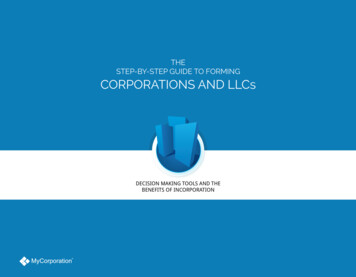
Transcription
THESTEP-BY-STEP GUIDE TO FORMINGCORPORATIONS AND LLCsDECISION MAKING TOOLS AND THEBENEFITS OF INCORPORATION
TABLE OF CONTENTSSTRUCTURESTATEIntroduction . 2Why consider business formation?. 3Liability ProtectionTax SavingsReduced Chance of AuditEstablishing a Professional IdentityChoose a State of Formation. 4Name the Corporation . 5Choose an Entity . 6Filing requirements . 6Decision Tree . 7Sole Proprietorship . 8General Partnership . 8Limited Partnership . 8C Corporation . 9S Corporation . 9Limited Liability Company . 9Professional Corporation and LLC . 9Comparing S Corporations and LLCs . 10Learning about Stock . 11Designate Corporate Directors . 12Designate a Registered Agent . 13File the Articles of Incorporation . 14First Meeting of the Board of Directors . 15Operate Your Corporation . 16About MyCorporationMYCORPORATIONNAMEENTITY TYPESTOCKDIRECTORSREGISTERED AGENTARTICLESMEETINGSOPERATEPAGE 1
INTRODUCTIONCongratulations on getting your small business up and running! Now is agreat time to consider whether incorporating or forming an LLC makes sensefor your business.Our incorporation guide will help you answer questions like what to expectwhen incorporating, what entity type is best for your business(C-Corporation, S-Corporation, or LLC), and what state to form in. This guideintroduces several of the most important factors to consider, including:The potential risks and liabilities of your businessThe formalities and expenses involved in establishingand maintaining the various businessstructuresYour income tax situation, andYour investment needs.THE MOST COMMON TYPES OF BUSINESSES ARE:Sole ProprietorshipGeneral PartnershipJoint VentureLimited PartnershipLimited Liability Partnership (L.L.P.)Limited Liability Company (L.L.C.)CorporationS CorporationNot-for-Profit CorporationProfessional CorporationMYCORPORATIONWHYSTATEThe first step in starting a smallbusiness is researching andselecting the appropriate legalbusinessstructurethatprovides the most benefit foryour particular needs.NAMEENTITY TYPESTOCKDIRECTORSREGISTERED AGENTARTICLESNOTE:Almost every businesscan benefit greatlyfrom the benefitsgained by forming anLLC or Corporation.Our Incorporation guide isdesigned specifically to help youanswer questions you may haveabout the process of forming anew business and the benefitsyou gain and your business willgain by doing so.PAGE 2MEETINGSOPERATE
WHY CONSIDER BUSINESS FORMATION?NOTE:You don’t have to be alarge operation withdozensof employeestobenefitfromincorporating.STATEUse the list of questions on thispage to quickly help youdetermine if incorporation isright for you.WHO IS INCORPORATION FOR?Many of MyCorporation’s customers are home-based,one-person businesses with less than 50,000 inrevenues—or even no revenues and just getting started.Why do businesses and investors considerincorporating?There are many benefits:Limited Liability: In our increasingly litigious society, itis becoming ever more important to limit your exposureand protect yourself from liability. As a sole proprietor,your liability for business debt is unlimited, meaningpersonal assets such as your home, personal bankaccounts and other valued assets may be at risk.Forming a corporation or LLC draws a firm line betweenyour personal and business assets, helping protect yourpersonal assets from risks or debts associated withrunning your business.MYCORPORATIONWHYTax Savings: As your business income grows, there maybe tax advantages to incorporating and paying taxes atcorporate rather than personal tax rates. Additionally, ifyou’re paying substantial self-employment taxes today,forming an S-corporation could help you save onincome taxes. We’ll discuss tax related issues in greaterdetail in a later section.Reduced Chance of Tax Audit: Historically soleproprietors tend to be more likely to file incorrectreturns (many are self-prepared), and tend tounderreport revenue or overreport deductions. Forthese reasons, the IRS has continually audited a muchhigher percentage of sole proprietor tax filings thancorporate filings.Establishing a Professional Identity: Many smallbusinesses choose to incorporate or form an LLC toprove their legitimacy to both customers and suppliers.Including the “Inc.” or “LLC” at the end of your businessname in all marketing and communications can help toseparate you from the competition.Raising Capital: If you are looking to raise capital,incorporating or forming an LLC also increases thelegitimacy of your company from an investor’sstandpoint. Investors are interested in making sure theyare investing in a sound business – one that has adheredto the proper formalities (whether you’ve formed acorporation or an LLC).PAGE 3NAMEENTITY TYPESTOCKDIRECTORSREGISTERED AGENTARTICLESMEETINGSOPERATE
CHOOSE A STATE OF FORMATIONWHYNOTE:Certain states aremore popular forcorporations andLLCs than others.STATEMany new business ownersare surprised to learn thatthere are really no legalrequirements to form theirbusiness in the state wherethey will conduct business.A BUSINESS CAN FORM A CORP OR LLC IN ANY STATEWhile states other than a company’s home state havebeen historically recognized as offering significantadvantages to corporations/LLCs, some of these“advantages” may not apply to a corporation thatmaintains “significant business contacts” or “significantpresence” within a particular state.FOR EXAMPLE: Forming a California corporation for asmall business located in California is usually the logicalchoice. While it is possible for the business to registersomewhere else, there are often reasons why this maynot be the best choice. Consider the followingdrawbacks to forming your business in a different state:MYCORPORATIONFILING FEESAn out-of-state corporation that will be conductingbusiness in California generally must “qualify” todo business in California. This “qualifying”requires the corporation to pay filing fees to theCalifornia Secretary of State in addition to whatever filing fees were paid in the state ofincorporation.STATE TAXESAn out-of-state corporation/LLC doing business inCalifornia will have to pay franchise taxes toCalifornia. The corporation may also have to payfranchise taxes in its state of incorporation (even ifthe corporation is not conducting business in thatstate). Thus, the corporation is potentially exposedto taxing by more than one state.SECURITIES LAWSThe California Corporate Securities Laws apply toany offer or sale of a security “in this state” regardless of the issuer’s state of incorporation.CORPORATE RULESRegardless of where the corporation is formed,many provisions of the California CorporationLaw, for example, apply if the corporation hasa sufficient “presence” in California.PAGE 4NAMEENTITY TYPESTOCKDIRECTORSREGISTERED AGENTARTICLESMEETINGSOPERATE
NAME THE CORPORATIONNOTE:Each state has it’sown rules for namingabusiness. Rememberto check your state forspecifics.STATENaming a company is likenaming a new baby. It’sexciting and you want the newbusiness name to be uniqueand creatively represent theproduct or services offered.ADVANCED:Some states may impose additional restrictions where thename implies certain activities that are regulated by statelicensing boards. While these names are not prohibitedfrom use, additional steps are required before they maybe used in a corporate name. Such words may include:‘Bank’, Insurance’, ‘Trust’, ‘Accounting’, and ‘Medical’.MOST STATES REQUIRE THE NAME CONTAINS ONEOF THE FOLLOWING CORPORATE Limited Liability CompanyMYCORPORATIONWHYPROHIBITED WORDS AND PHRASESAdditionally, most states prohibit the use of acorporate name that is “substantially similar” tothat of a corporate or LLC name already inexistence or dissolved within the past 2 years.Also, the use of obscenities, profanity, or a namethat may be considered “deceptive” is prohibitedin most states.PROTECTING THE CORPORATE NAMEGenerally, incorporating a business under aspecific name will only prevent another individualfrom forming a corporation with the same name inthe same state. Thus, it is possible that anindividual may incorporate with that corporatename in another state. In some states, it is alsopossible that an individual may form an LLC orsoleproprietorship in the SAME state as thecorporation you are naming.SECURING A DOMAIN NAMEDuring the naming process it is important to makesure the names being considered are alsoavailable as a domain and register that domain assoon as possible. In addition, one should considerregistering its similar variants and differentextensions like mycompany.com, mycompany.net,mycompany.biz, etc. This critical step will helpprotect each company’s online identity.PAGE 5NAMEENTITY TYPESTOCKDIRECTORSREGISTERED AGENTARTICLESMEETINGSOPERATE
CHOOSE AN ENTITYNOTE:Each entity type hasits own strengths andweaknesses thatshould be taken intoconsideration.WHYSTATEBusiness formations come inmany different shapes andsizes. A choice should bemade depending on yourspecific needs, within yourshort and long-term goals.MEDICAL/RETIREMENT BENEFITS BY ENTITYFirst, let’s take a look at the medical andretirement tax benefits accorded the differententities and how they are then treated by theparticipating parties.NAMEENTITY TYPESTOCKDIRECTORSBUSINESS ENTITY FILING REQUIREMENTSNo Filing Required ( no liability protection )Sole ProprietorGeneral PartnershipLimited PartnershipState/Federal Filing RequiredC-CorporationS-CorporationLimited Liability CompanyProfessional CorporationNon-Profit CorporationMYCORPORATIONPartnership/ LLCS-CorpREGISTERED AGENTC-CorpARTICLESEntity ducted as aGuaranteedPaymentDeductible as W-2wage not subject toFICA/MedicareDeductible asoperating expensein same manner aspayments for nonshareholderemployeesDistribution topartner/ memberDeductible asoperating expensein the same manneras non- shareholderemployeesDeductible asoperating expensein same manner aspayments for nonshareholderemployeesPartner/Member/Shareholder TreatmentMedicalInsuranceDeductible as anadjustment toincome on page 1 ofForm1040Income included inW-2 Box 1,explanation in Box14; deduct on Form1040 as SE medicalinsuranceNot income toemployee/shareholder; noentry on Form 1040RetirementContributionsDeductible as anadjustment toincome on page 1 ofForm 1040No entry for 1040No entry for 1040PAGE 6MEETINGSOPERATE
CHOOSE AN ENTITYWHYSTATEA FEW SIMPLE QUESTIONSWe have developed this easy to use decision tree to illustratethe decision process of choosing the correct entity type.Consider the pros and cons at each juncture and you will bewell on your way to choosing the correct entity.NAMEENTITY TYPESTOCKDIRECTORSREGISTERED AGENTOne OwnerNo Concerns aboutPersonal LiabilitySole ProprietorshipARTICLESMEETINGSAll Partners areActive ManagersGeneral PartnershipSome Silent PartnersLimited PartnershipMultiple PartnersEntity Decision TreeAbility to go publicConcerns aboutPersonal LiabilityC CorporationSelf EmploymentTax BenefitsS-CorporationFewer CorporateFormalitiesLimited LiabilityCompanyAvoid Double TaxationMYCORPORATIONPAGE 7OPERATE
CHOOSE AN ENTITYWHYLet us now take a look at the characteristics and legal factors/requirements for the various business entities.Sole ProprietorshipSTATELimited PartnershipNAMEENTITY TYPECharacteristicsLegal RequirementsCharacteristicsLegal RequirementsBusiness is operated by a singleperson.The owner is not consideredan employee (self employed)The simplest form of business.Comparatively easier & lessexpensive to maintain.Separate business and personalbooks are kept.Individuals can start up a soleproprietorship.No legal formalities.Business licenses or permits maybe required.All assets & liabilities of thecompany are passed to theindividual.Business income is reportedon the individuals’ Form 1040,Schedule C.A partnership that is made up ofone or more general partners andone or more limited partners.The difference between a generalpartner and limited partner - thelimited partner is not personallyliable for debts of the partnership.Limited partners can only lose theamount they paid as a capitalcontribution or received from thepartnership.A limited partner may notparticipate in management of thebusiness.If a limited partner doesparticipate, he or she may incurpersonal liability with the samerepercussions as a general partner.Serves as a means to raise moneyfrom limited partners -withouthaving to take in new partnersas active members in thebusiness or -engage in thecomplexities of starting acorporation and issuing stock.Depending on the business typeand location, may be required toobtain business licenses orpermits.May be required to file apartnership certificate with apublic office.General PartnershipCharacteristicsLegal RequirementsBusiness is operated by two ormore people.Partnership agreement shouldbe prepared.Partners are not consideredemployees of the company,but self-employed individuals.Personal and partnership assetsmay be at risk.Not required to pay separatebusiness income taxes.Must file an information returnindicating amount of moneyearned or lost during the yearby each partner.Each partner is responsible forpaying their share of personalincome tax.May be required to obtainbusiness licenses or permits.May be required to file apartnership certificate.MYCORPORATIONPAGE 8STOCKDIRECTORSREGISTERED AGENTARTICLESMEETINGSOPERATE
CHOOSE AN ENTITYWHYSTATEC - CorporationLimited Liability CompanyNAMEENTITY TYPECharacteristicsLegal RequirementsCharacteristicsLegal RequirementsConsidered a separate entity fromthose who own or operate.Limited personal liability &protection from being liable fordebts (e.g., bills for supplies/equipment and injuries topersons involved in businessactivities that are not adequatelycovered by standard insurance)One person may own all thestock.Created under state law (byfiling documents with theSecretary of State).Tax must be paid on the incomemade by the corporation.If income is distributed toshareholders as dividends, theshareholders must pay tax onamount received as dividends.Limited Liability Companiescombine the limited liabilityadvantages of corporations withthe control and tax advantages ofa partnership.A Limited Liability Company ismore complicated than a normalpartnership in its formation.Owners are generally not liable forthe debts and obligations of theLLC.Can elect how an LLC will be taxed.The entity is taxed like apartnership - income and lossesof the LLC are accounted for onthe owner’s individual tax returns.Can be owned by non-U.S. citizen/resident aliens and otherbusiness entities.Can have unlimited number ofmembers - owners of an LLC areknown as membersLess formal than a corporation.Professional Corporations & PLLCsLegal RequirementsLimited liability & protection frompersonal liability for debts. Ownerspay personal income taxes.Business losses may be offsetagainst other income - couldreduce or eliminate owner’s taxburden.Generally not subject to taxationat the federal level.Shareholders are required to paytheir share of income tax on thecorporation’s income, whetheror not they received money.Personal and partnership assetsmay be at risk.Not required to pay separatebusiness income taxes.Must file an information returnindicating amount of moneyearned or lost during the yearby each partner.Each partner is responsible forpaying their share of personalincome tax.May be required to obtainbusiness licenses or permits.May be required to file apartnership certificate.MYCORPORATIONDIRECTORSREGISTERED isticsSTOCKCharacteristicsLegal RequirementsCertain occupations mayincorporate through aprofessional corporation only.May incorporate as a professionalcorporation or as a regularcorporation.All shareholders mustbe licensed.Created under state law.Limited personal liability andprotection from being personallyliable for debts of othermembers.Still liable for own malpractice.PAGE 9
CHOOSE AN ENTITYWHYCOMPARING S-CORPORATIONS AND LLCsSTATEDIFFERENCESSIMILARITIESOwnership – Owners of LLCs are called members and owners of SCorporations are called shareholders. There are significantdifferences in ownership rules. S-Corps may not have more than100 shareholders; LLCs are unlimited. S-Corps are not allowed tohave non-U.S. citizens as owners; LLCs can. S-Corps cannot beowned by other companies; LLCs can.Formation – Both entities are separate legalentities created under state law by filing Articlesof Incorporation/Organization with Secretary ofState.Formalities – S-Corps must adhere to certain formalities in orderto retain their legal corporate status. LLCs do not have to followsuch formalities.Transfer of Ownership - Corporate shareholders may freelytransfer their ownership shares. LLCs members usually needapproval from the other members.Management – S-Corps have centralized management. An LLCmay be managed by its members, in which case it is similar to apartnership. Or it may be managed by appointed managers.Allocation of Income – Income from an S-Corp must be allocatedto its shareholders based on stock ownership. LLCs may speciallyallocate income and losses to its members irrespective of ownership percentage.NAMELiability – Both entities provide strong liabilityprotection for owners, meaning the owners aregenerally not liable for the debt/liabilities of thebusiness.Taxation – Both entities are pass-through ent
Corp. LLC L.L.C Limited Liability Company MOST STATES REQUIRE THE NAME CONTAINS ONE OF THE FOLLOWING CORPORATE INDICATORS: NAME THE CORPORATION Naming a company is like naming a new baby. It’s exciting and you want the new business name to be unique and creatively represent the product or services of











